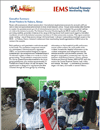Executive Summary – Informal Economy Monitoring Study: Street Vendors in Nakuru, Kenya
Recent advancements in official statistics show that informal employment accounts for as much as 80 per cent of total non-agricultural employment in most of sub-Saharan Africa. Though some studies offer theories to explain the persistence and growth of informal employment, few have evaluated the grounded realities of work in the informal economy. The Informal Economy Monitoring Study (IEMS) seeks to fill this gap, providing credible, grounded evidence of the range of driving forces, both positive and negative, that affect conditions of work in the informal economy over time in 10 cities across nine countries.
This executive summary examines street vending – one of three sectors (along with home-based work and waste picking) explored as part of the IEMS – in Nakuru, Kenya. It features the perspectives of women and men who are members of the Kenya National Alliance of Street Vendors and Informal Traders (KENASVIT) and who trade in the Central Business District, both within and outside “the stage” – a confluence of bus stops/ stages with heavy foot traffic in central Nakuru.
Read the Full Report | Resumen ejecutivo (en español) | Sumário Executivo (en portugués)
The Informal Economy Monitoring Study (IEMS) is designed to provide in-depth understanding of how informal workers are affected by and respond to economic trends, urban policies and practices, value chain dynamics, and other economic and social forces. Learn more about the Informal Economy Monitoring Study.
View list of all: Research Reports

